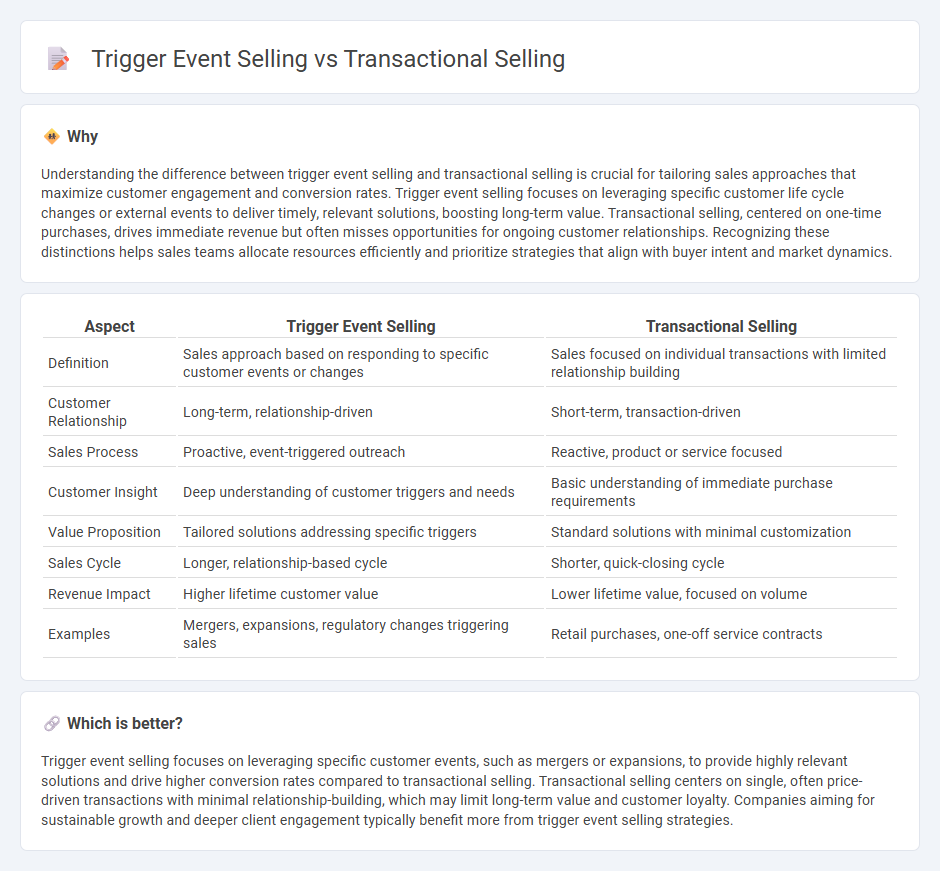
Trigger event selling focuses on identifying and leveraging specific customer circumstances or changes that create immediate sales opportunities, contrasting with transactional selling which emphasizes single, price-driven exchanges without deeper customer engagement. By prioritizing contextual insights and personalized timing, trigger event selling often leads to higher conversion rates and stronger client relationships. Explore how integrating trigger event strategies can transform your sales approach for more impactful results.
Why it is important
Understanding the difference between trigger event selling and transactional selling is crucial for tailoring sales approaches that maximize customer engagement and conversion rates. Trigger event selling focuses on leveraging specific customer life cycle changes or external events to deliver timely, relevant solutions, boosting long-term value. Transactional selling, centered on one-time purchases, drives immediate revenue but often misses opportunities for ongoing customer relationships. Recognizing these distinctions helps sales teams allocate resources efficiently and prioritize strategies that align with buyer intent and market dynamics.
Comparison Table
| Aspect | Trigger Event Selling | Transactional Selling |
|---|---|---|
| Definition | Sales approach based on responding to specific customer events or changes | Sales focused on individual transactions with limited relationship building |
| Customer Relationship | Long-term, relationship-driven | Short-term, transaction-driven |
| Sales Process | Proactive, event-triggered outreach | Reactive, product or service focused |
| Customer Insight | Deep understanding of customer triggers and needs | Basic understanding of immediate purchase requirements |
| Value Proposition | Tailored solutions addressing specific triggers | Standard solutions with minimal customization |
| Sales Cycle | Longer, relationship-based cycle | Shorter, quick-closing cycle |
| Revenue Impact | Higher lifetime customer value | Lower lifetime value, focused on volume |
| Examples | Mergers, expansions, regulatory changes triggering sales | Retail purchases, one-off service contracts |
Which is better?
Trigger event selling focuses on leveraging specific customer events, such as mergers or expansions, to provide highly relevant solutions and drive higher conversion rates compared to transactional selling. Transactional selling centers on single, often price-driven transactions with minimal relationship-building, which may limit long-term value and customer loyalty. Companies aiming for sustainable growth and deeper client engagement typically benefit more from trigger event selling strategies.
Connection
Trigger event selling leverages specific customer actions or external occurrences to initiate timely sales conversations, enhancing transactional selling by aligning offers with immediate buyer needs. Transactional selling focuses on quick, efficient exchanges, which are optimized when trigger events identify the precise moment a customer is ready to purchase. Integrating trigger event insights into transactional sales processes boosts conversion rates and shortens sales cycles.
Key Terms
Transaction-focused
Transactional selling prioritizes quick, efficient exchanges centered on immediate customer needs, emphasizing price, product features, and speed over long-term relationships. This approach targets buyers seeking fast solutions without complex decision processes, often driven by specific, immediate requirements. Learn more about how transactional selling can optimize sales strategies for time-sensitive markets.
Relationship-building
Transactional selling prioritizes quick, one-time sales with minimal focus on long-term customer relationships. Trigger event selling emphasizes identifying and leveraging specific customer events or changes to initiate meaningful interactions and foster deeper connections. Explore how integrating relationship-building strategies can enhance both sales approaches.
Event-driven
Transactional selling emphasizes quick, single sales interactions typically centered on price and product features, aiming for immediate customer commitment. Trigger event selling, by contrast, focuses on leveraging specific events such as organizational changes, market shifts, or technology upgrades to identify timely sales opportunities and tailor solutions accordingly. Explore the strategic advantages of event-driven selling to capitalize on dynamic customer needs.
Source and External Links
What is transactional selling, and how does this approach work? - Transactional selling focuses on making quick, one-time sales by emphasizing competitive pricing, urgency, and minimal relationship-building, aiming to close as many deals as possible in a short time.
Transactional selling: Strategy, definition and how it works - This strategy drives immediate revenue through rapid, high-volume sales with little personalization, using tactics like scarcity and promotional offers to motivate quick purchases.
The One-Call Close: A guide to transactional sales - Transactional selling prioritizes speed and efficiency, closing deals fast with minimal customer interaction, and is ideal for simple products or services that don't require ongoing support.
 dowidth.com
dowidth.com